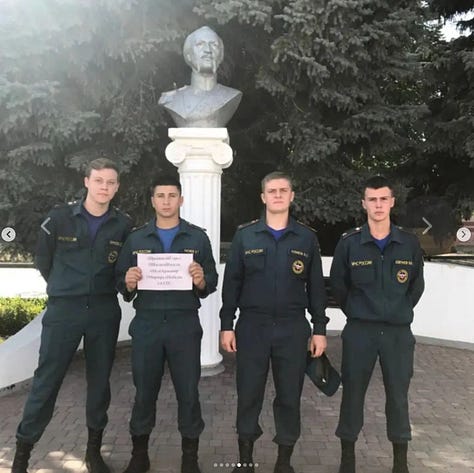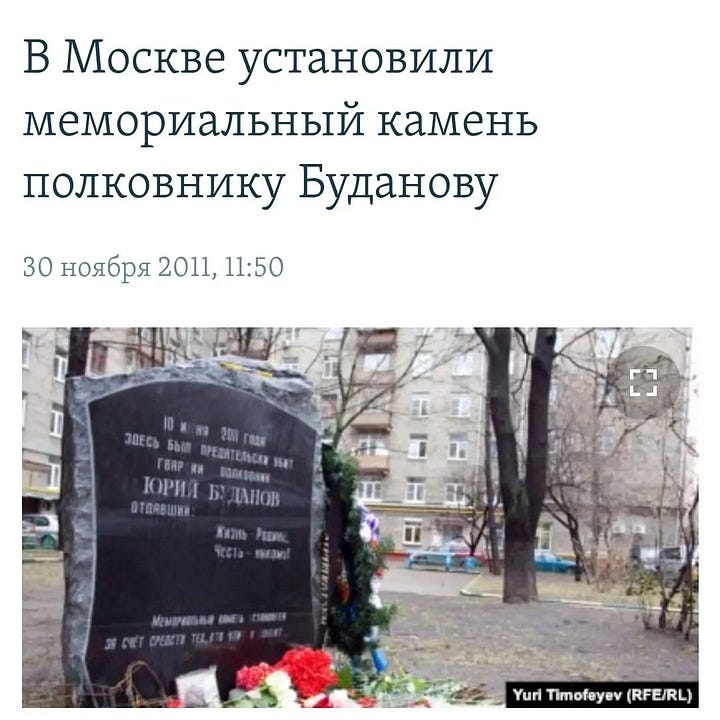Exhibit Featuring Shamil Basayev’s Photo Sparks Controversy at Abkhaz State Museum
For the Abkhaz people, Shamil Basayev is considered a Hero of Abkhazia for his contributions during the Georgian-Abkhazian war of 1992-93.

The Abkhaz State Museum hosts an exhibit dedicated to volunteer fighters who participated in the war in Abkhazia, which has included a photograph of Shamil Basayev since 2012. Recently, a Russian visitor noticed the photograph and shared it online, sparking outrage among Russian Z-bloggers and others.
Following the outcry, the RBC news agency reported that the museum temporarily closed access to the exhibit after the Russian Embassy intervened. Many Russians expressed their anger, commenting on the exhibit’s content.
The Russian Embassy in Abkhazia issued a statement saying, "We consider the display of Sh.S. Basayev's portrait in the exposition of the State Museum of Abkhazia to be unacceptable."
Meanwhile, the (South) Ossetian community responded to the exhibition, which has been showcasing the War of Independence for over a decade.
Ossetian blogger Alik Puhati wrote on X (formerly Twitter): “In any normal state, there is a procedure to strip someone of their hero status if they have been involved in crimes. If for Abkhazia, the terrorist Shamil Basayev remains a ‘hero’ despite his terrorist activities (such as the seizure of a maternity hospital and a school), this is a significant problem for the small Caucasian state. Firstly, it will severely harm relations with Ossetia and Russia, and secondly, it gives Georgia the full right to claim that Abkhazia openly glorifies terrorists.”
Another Ossetian, speaking to Ekho Kavkaza, commented: “People’s outrage is understandable, but on the other hand, how are you going to tell the story of Abkhazia's War of Independence without mentioning Shamil Basayev? It’s like during Stalin’s time when repressed state officials were erased from group photos with the leader. There were four in the picture, and then there were three... Is that how it is?”
“Basayev, incidentally, was friends with Valery Khubulov [commander of the Ossetian units involved in combat operations in North Ossetia and Abkhazia. In 1993, the Ministry of Defence of South Ossetia was established under Khubulov’s leadership]. Basayev visited Tskhinval at Khubulov’s invitation. He helped debunk the myth that Ingush people were languishing in the dungeons of South Ossetia, allegedly abducted during the Ossetian-Ingush conflict of 1992. Later, he became the most notorious terrorist. If we are to speak objectively, we must also explain how he became what he did. The main thing is not to lie.”
AW Comments and Local Reactions from Abkhazia
As AbkhazWorld, we also shared our perspective on the issue. Our comment, along with reactions from Abkhazia, are as follows:
Late Musa (Yuri) Shanibov once said about Shamil Basayev: “Like me, Basayev was a Communist youth member and a romantic. I never saw him pray.”
Of course, nothing justifies Basayev’s actions in Beslan massacre or the Budyonnovsk hospital raid. We deeply mourn the innocent lives lost due to his later actions, and we do NOT condone terrorism in any form. However, his contributions to Abkhazia during a critical time in our history are a separate chapter that remains significant to us. It should not be forgotten that Basayev did not come to Abkhazia as a terrorist; he was an ordinary Chechen, as Shanibov described. He arrived as part of the Confederation of Mountain Peoples of the Caucasus and, with his battalion, participated in significant operations, including the liberation of Gagra from the Georgian occupation. It was the wars and tragedies he experienced that radicalised him and led to his later actions.
Honouring Basayev for his role in our liberation does not mean we support or excuse the heinous acts he committed afterwards. It is possible to recognise the positive impact someone had in a specific context while condemning their later actions.
Alik Puhati states that this sutiation “gives Georgia every right to point out that Abkhazia openly glorifies terrorists."
For Georgians, we are all terrorists, we are all separatists, we are all bloody murderers anyway. Our crime is responding when they attacked us mercilessly, armed to the teeth, our crime is protecting our loved ones and our homeland from these invaders... From this mini-empire... Let them hurl yet another slander at us. What difference will it make? Will they do more than they have already done? Let them do it. Were they not the ones who supported Russia in the first Russo-Chechen war? Didn't Russian planes take off from the Vaziani airbase in Georgia and strike Chechnya? Now, will their anti-Russian stance change these facts? Let's discuss the facts, the history, without prioritising interests and relationships... Because all of these are lived REALITIES.
+ Selected FBIS Reports on Chechnya, Abkhazia & the Chechen War
+ The Brotherhood of Warriors: Abkhazia's Volunteer Heroes and the Chechen "Wolf Pack"
We also understand that this stance may complicate our relationships with neighbouring countries. However, each nation has the sovereign right to honour individuals who have shaped its history, just as others do despite international disagreements.

Historical figures are often complex, and many nations grapple with the duality of their legacies. We believe in acknowledging all facets of our history, even when they involve controversial figures. Many countries honour leaders or heroes who had both positive and negative impacts. For instance, some figures are celebrated for their roles in independence movements despite later actions that are widely condemned. So, Basayev's role in our past is also complex. His contributions to Abkhazia during the war are part of our history, even as we condemn the tragic and inexcusable acts he committed later.
Dzhokhar Dudayev welcomes Shamil Basayev's Abkhazia Battalion.
Basayev’s later terrorist activities do not invalidate the actions he took in the past. Those who oppose his recognition as a significant figure could also criticise Russia, which levelled Chechnya in two wars and committed numerous human rights violations, and choose to cut it out of their lives. If Basayev’s later terrorist actions are condemned, then the consequences of Russia’s actions in Chechnya should be the same - or even more severe. Therefore, if one wishes to be consistent, one should also consider the implications of Russia's actions in Chechnya. Let’s be honest! There’s no need for politics, lies, or fear. We all know what happened in Chechnya. Would a 'normal country' act like this? We are talking about 'normal countries', aren't we?
Acknowledging Basayev's role during a critical period in our history is part of our national narrative. We recognise the contributions of all those who came to our aid, including the members of the Confederation of Mountain Peoples of the Caucasus who came from various parts of the region.
Reactions from Abkhazia
Guram Inapshba: “In our military history, there are individuals who have made significant contributions, worked tirelessly, and set an example with their bravery. There must be combat skills that the youth, who will become tomorrow’s soldiers, can learn from. One of these figures was Shamil Basayev, a Hero of Abkhazia. After the war, he was not one of those who sought medals or recognition. Following our victory, he felt he had done his part and returned to his homeland. His subsequent journey was linked to another state, one whose judgement we do not decide. Our duty is to appreciate his contributions to our history. Vladislav [Ardzinba] honoured him with the title of Hero of Abkhazia. For the Abkhaz people, Shamil Basayev is a Hero of Abkhazia. Our history cannot be rewritten just because outsiders wish it so.”
ChegNews (Abkhazian News channel):
“In response to the uproar from Ivanov, who have forgotten their roots, regarding the photo of Shamil Basayev in the Abkhazian State Museum.
In the first two photographs, there is a monument and an image on the 5,000 rouble banknote dedicated to one of the executioners of the Russo-Caucasian War, General N. N. Muravyov (Amursky), who led punitive expeditions in Abkhazia.


Next is a monument in Pyatigorsk to General Yermolov. Yermolov was one of the leaders of the Tsarist army during the Russo-Caucasian War, known for his brutality and his implementation of the "scorched earth" strategy against the mountaineers. Beyond fighting armed groups, his army engaged in the mass killing of civilians, including women and children, acts of rape, burning of villages, crops, and livestock. Part of this strategy also involved the mass deportation of indigenous people, leading, among other things, to the settlement of Georgians in Abkhazia.





There is also a monument to [General] Zass in Armavir. N. I. Lorier wrote: "In support of Zass's preached idea of instilling fear, Circassian heads were constantly impaled on spikes on a specially erected mound near Prochny Okop, with their beards fluttering in the wind. It was a sad sight to behold this disgusting spectacle."
+ Beverage Brand 'General Zass' Sparks Outrage in Circassian Community
Another monument honours Colonel Budanov, who, during the Chechen war, raped and murdered an 18-year-old Chechen girl, Elza Kungayeva. He was convicted for this crime and served nine years in prison. After his release, he was killed like a dog by Chechens on the streets of Moscow. Kind-hearted Muscovites still honour his monument with flowers.
We demand an explanation from the Russian Embassy in Abkhazia.”
Aslan Kobakhia, Hero of Abkhazia:
“The world isn’t as dreadful as it seems. Some people have panicked so much because of the bad weather that I feel, if they had the chance, they would have fled Abkhazia. Political storms around Abkhazia will also cease if we don’t add fuel to the fire ourselves. Our overseers suddenly noticed a photograph of Shamil Basayev in our national museum, which has been hanging there for decades. Basayev’s actions in Abkhazia will always be highly valued by our people, but his subsequent path should be judged by the Chechen and Russian peoples. We are not judges appointed by God! And to those desperately trying to find even the slightest hint of anti-Russian sentiment in Abkhazia, my advice is: there is a daily recruitment of volunteers for the Russian army, that’s where you need to go to really help Russia!!!”





